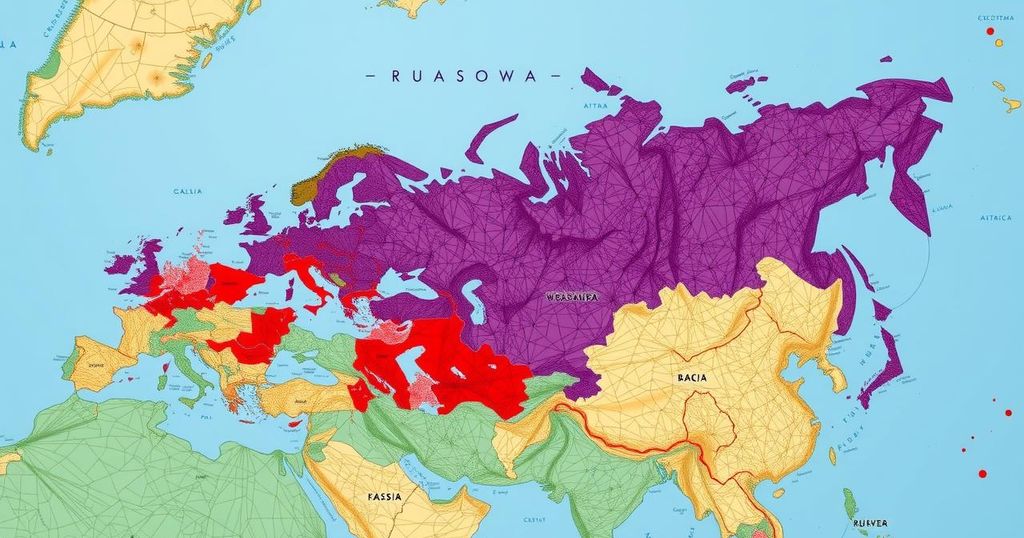Russia is reinforcing its geopolitical and economic positioning towards Kazakhstan, anticipating future developments under a Trump presidency. President Putin’s state visit emphasizes the need for enhanced cooperation and security frameworks amid existing sanctions and wartime strains. The proposed three-step strategy aims to consolidate regional ties and fortify Russia’s manufacturing capabilities, helping Moscow navigate the impending geopolitical challenges stemming from a U.S. leadership transition.
Amidst geopolitical shifting tides, Russia is intensifying its focus on eastern partnerships, particularly with Kazakhstan, in anticipation of the implications following Donald Trump’s potential return to the U.S. presidency. President Vladimir Putin’s recent visit to Astana aims to solidify strategic cooperation and security frameworks, marking a critical moment for regional dynamics as Moscow seeks to realign its economic and defense policies amidst growing tensions with the West. In light of Trump’s projected ‘golden age’ for America, Russia views an opportunity to bolster its domestic light industry and revitalize regional cooperation through the Eurasian Economic Union and the Collective Security Treaty Organization (CSTO).
The significant dialogue during Putin’s visit centers around creating a unified defense architecture while fostering economic ties that can withstand the liberalizing forces expected to accompany a Trump administration. Russia’s overall strategy emphasizes the integration of western Siberia with Central Asia’s industrial bases, aiming to project strength and mitigate the impacts of sanctions imposed by developed economies. However, the Kremlin must navigate ongoing internal challenges owing to wartime operational constraints and the exigencies of sustaining its economic resilience in this transitional phase.
Given the backdrop of recent conflicts, such as the Russia-Ukraine war, Kazakhstan’s leadership has reiterated the importance of bilateral relations, distancing itself from the narrative of Russian threat while affirming a commitment to mutual respect and cooperation. The Kremlin also seeks to convey to Central Asian nations that it does not intend for its conflicts to encroach upon their territorial integrity, presenting its engagement as a stabilizing force in the region.
In light of these developments, Putin’s three-pronged strategy encompasses enhancing collective regional security, boosting economic integration across transport and energy infrastructures, and ensuring readiness against external pressures, notably from the United States. This multifaceted approach reflects an acknowledgment of the intricate interplay between economic goals and security commitments in a rapidly evolving global landscape, designed to secure Russia’s interests and assert its influence within the Eurasian context.
The article discusses Russia’s strategic maneuvers in Central Asia, particularly focusing on Vladimir Putin’s recent visit to Kazakhstan following the election of Donald Trump as U.S. President. It highlights how Russia seeks to foster ties with Kazakhstan and strengthen the regional security framework in response to geopolitical changes anticipated during Trump’s second term. The article provides a broader context of Russia’s internal challenges driven by sanctions and wartime conditions while exploring its aspirations to maintain influence and economic stability within the region amid rising global tensions.
In summary, Russia’s eastward push exemplified by Putin’s engagement with Kazakhstan marks a strategic pivot aimed at consolidating its influence in the face of anticipated geopolitical shifts under a Trump administration. Through a robust framework of security and economic cooperation, Moscow endeavors to revive its position as a significant player in regional dynamics, affirming its commitment to safeguarding its interests while mitigating the impacts of Western sanctions. The successful implementation of this strategy may well determine Russia’s ability to navigate the complexities of modern international relations.
Original Source: www.thinkchina.sg






